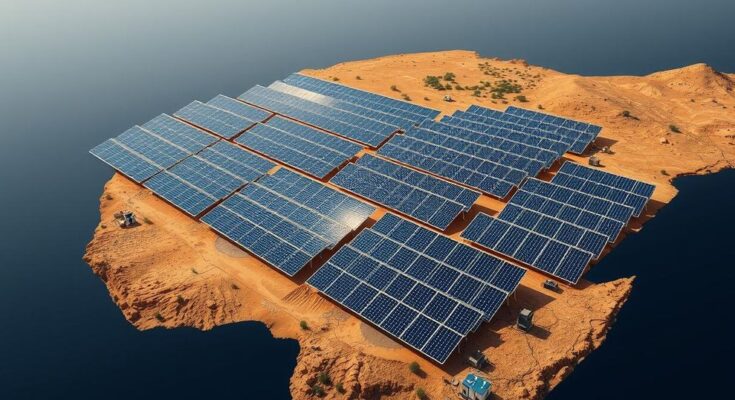Egypt has entered into a solar power agreement with Djibouti to lessen the latter’s dependence on Ethiopia for energy. The deal includes constructing a solar farm and training local technicians. As Djibouti increases its energy consumption and aims for renewable sources, this collaboration highlights shifting geopolitical ties in the Horn of Africa amidst historic tensions over Nile water rights between Egypt and Ethiopia.
Egypt has strengthened its diplomatic and economic relations with Djibouti through the initiation of a solar power project aimed at diversifying the energy sources for the Horn of Africa nation. This development is strategically significant as it reduces Djibouti’s dependence on Ethiopia, with whom Egypt has maintained a fraught relationship due to ongoing territorial and resource disputes. The project entails the establishment of a solar power farm in Djibouti’s arid regions, with future expansions expected to reach up to 300 kilowatts of capacity. Egypt will not only finance the project but also provide training for local technicians to ensure the operational viability of the plant. The agreement was formalized in a virtual signing session between Egyptian Minister of Energy, Mahmoud Essmat, and his Djiboutian counterpart, Yonis Ali Gued, who discussed the economic benefits while sidestepping the geopolitical ramifications. Djibouti’s government has articulated that this collaboration aligns with President Ismail Omar Guelleh’s vision of prioritizing energy as a key driver for national economic and developmental progress. Observers note that this renewed cooperation between Djibouti and Egypt carries significant implications for the broader Horn of Africa region, particularly in the context of the historical tensions between Ethiopia and Egypt over Nile water rights and security arrangements in Somalia. Djibouti traditionally maintains robust trade relations with Ethiopia, with the latter reliant on Djibouti for nearly all imports and Djibouti importing over 60 percent of its electricity from Ethiopia. Furthermore, Ethiopia and Djibouti are interconnected through a recently established transmission line and power station funded by the African Development Bank, which strengthens their utility relationship. Additionally, Djibouti’s electricity demands are projected to rise due to increased commercial activity at its port, leading to a future consumption forecast of approximately 1GWh daily by 2030. In pursuit of sustainable energy solutions, Djibouti is actively exploring investments in renewable energy initiatives, including solar and geothermal technologies. The World Bank estimates that the current electricity access rate in Djibouti is about 65 percent, with projections indicating an increase to 72 percent once the newly constructed transmission line becomes operational and likely higher following the implementation of the solar power initiative.
The Horn of Africa has long been a region marked by geopolitical tensions, particularly between Egypt and Ethiopia, stemming from competing interests in the Nile River’s water resources. Djibouti, as a strategic location with vital trade routes and connections to Ethiopia, plays a crucial role in regional dynamics. The push for renewable energy sources, particularly solar power, comes amid rising electricity demands in Djibouti and an increasing need to diversify energy supplies beyond reliance on Ethiopia, where complexities in bilateral relations are ongoing. The recent solar power agreement between Egypt and Djibouti emerges as a pivotal maneuver in regional energy politics, with potential ripple effects on Egypt’s relations with Ethiopia and other neighboring states.
The solar power project between Egypt and Djibouti represents a strategic economic partnership aimed at enhancing energy independence for Djibouti while simultaneously reducing its reliance on Ethiopia. It underscores both countries’ commitments to sustainable energy development amidst a complex landscape of regional political dynamics. As Djibouti seeks to bolster its energy capacity and Egypt enhances its influence in the Horn of Africa, the implications of this cooperation extend beyond economic collaboration, potentially reshaping the regional power balance regarding resource management and political alliances.
Original Source: www.theeastafrican.co.ke




